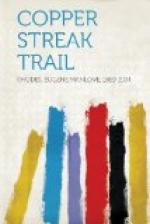They left the boy at his mending and took the back track. Before they had gone a dozen yards Dewing saw the lost spur, far down the hill, lodged under a prickly pear. Stanley, searching intently for his pocketbook, did not see the spur. And Dewing said nothing; he lowered his eyelids to veil a sudden evil thought, and when he raised them again his eyes, which for a little had been clear of all save boyish mischief, were once more tense and hard.
Robert E. Lee Carr clattered gayly by them and pushed up the hill to recover his hat. The two men rode on slowly; a brown pocketbook upon a brown hillside is not easy to find. But they found it at last, just where Stanley had launched his pursuit of the hatless horseman. It had been jostled from his pocket in the first wild rush. Stanley retrieved it with a sigh of relief.
“Are you sure you had your spur here?” asked Dewing. “Maybe you lost it before and didn’t notice it.”
“Oh, never mind the spur,” said Stan. “I’m satisfied to get my money. Let’s wait for Little Boy Blue and we’ll all go in together.”
“Want to try a little game to-night?” suggested Dewing. “I could use that money of yours. It seems a likely bunch—if it’s all money. Pretty plump wallet, I call it.”
“No more for me,” laughed Stanley. “You behold in me a reformed character.”
“Stick to that, boy,” said Dewing. “Gambling is bad business.”
It grew on to dusk when Robert E. Lee Carr rejoined them; it was pitch dark when they came to the Carr camp-fire at Hospital Springs, close beside the trail; when they reached Cobre, supper-time was over.
At the Mountain House Stanley ordered a special supper cooked for him, with real potatoes and cow milk. Dewing refused a drink, pleading his profession; and Stanley left his fat wallet in the Mountain House safe.
“Well, I’ll say good-night now,” said Dewing. “See you after supper?”
“Oh, I’ll side you a ways yet. Goin’ up to the shack to unsaddle. Always like to have my horse eat before I do. And you’ll not see me after supper—not unless you are up at the post-office. I’m done with cards.”
“I’d like to have a little chin with you to-morrow,” said Dewing. “Not about cards. Business. I’m sick of cards, myself. I’ll never be able to live ’em down—especially with this pleasing nickname of mine. I want to talk trade. About your ranch: you’ve still got your wells and water-holes? I was thinking of buying them of you and going in for the straight and narrow. I might even stock up and throw in with you—but you wouldn’t want a partner from the wrong side of the table? Well, I don’t blame you—but say, Stan, on the level, it’s a funny old world, isn’t it?”
“I’m going to take the stage to-morrow. See you when I come back. I’ll sell. I’m reformed about cattle, too,” said Stan.
At the ball ground he bade Dewing good-night. The latter rode on to his own hostelry at the other end of town. Civilization patronized the Admiral Dewey as nearest the railroad; mountain men favored the Mountain House as being nearest to grass.




